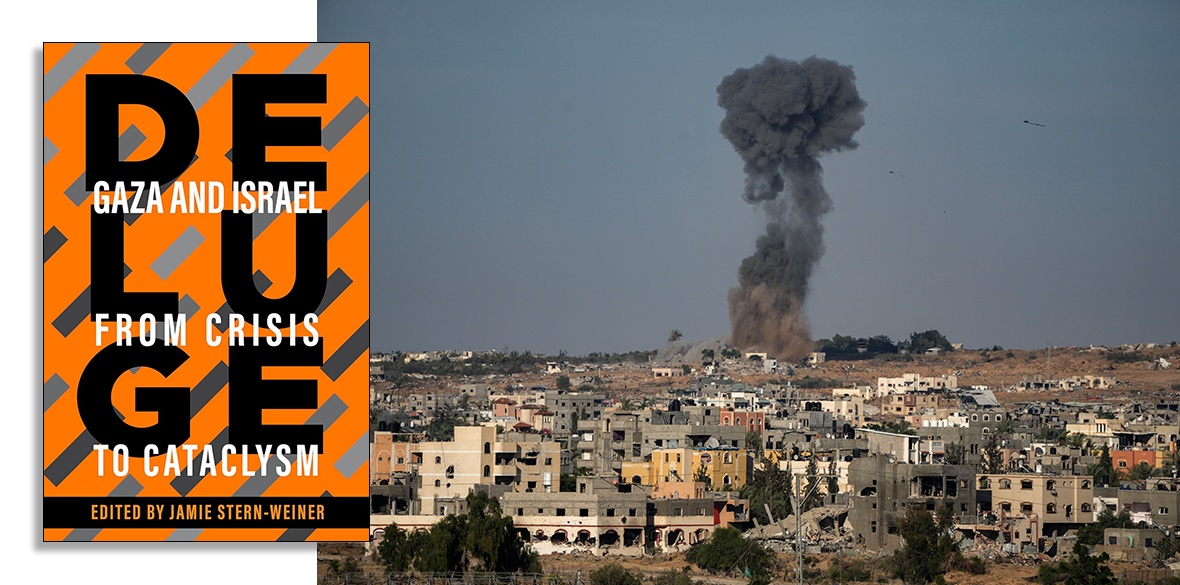This is the last article you can read this month
You can read more article this month
You can read more articles this month
Sorry your limit is up for this month
Reset on:
Please help support the Morning Star by subscribing here
Deluge: Gaza and Israel from Crisis to Cataclysm
Edited by Jamie Stern-Weiner
OR books, £17.99
ON 7 October 2023, Hamas launched an extensive surprise attack (which it called al-Aqsa Deluge) against Israeli soldiers and civilians that was unprecedented in its ferocity and reportedly occurred without the knowledge of the group’s regional allies. Around 1,200 Israelis, the majority civilians, were killed while another 250 were taken hostage.
The subsequent weeks and months saw Hamas’s terrorism repaid by Israel’s extreme aggression as the latter launched an extensive bombing campaign and ground invasion, the brutality of which made all previous incursions pale in comparison.
Amid the confusion, anger and sorrow felt by Israelis and Palestinians in the days following October 7, many questions were asked about why Hamas launched the attack and how it managed to catch one of the world’s most sophisticated military forces off guard.
Deluge: Gaza and Israel from Crisis to Cataclysm is edited by Israeli-born Oxford University doctoral candidate Jamie Stern-Weiner and comprises 13 chapters each written by an academic, journalist, human rights activist or MEP with extensive knowledge or direct experience of the conflict in Palestine. Several writers are Israeli or of Jewish descent.
The chapters were written in the weeks and months following October 7 and go a long way to explaining how numerous factors and conditions, some years in the making, precipitated the tragedies that occurred on 7 October and during the months that followed.
We also learn that Israel missed numerous opportunities to end the conflict in Palestine over the past half century when the PLO made overtures with a view to offering a peaceful settlement. Some contributors explain that, at the time, the risk of peace was a major concern for successive Israel governments, some of whom would even escalate aggression on spurious pretexts in the face of this threat.
We also learn that further opportunities for de-escalation and peaceful coexistence between Palestinians and Israelis were missed after Hamas surprised everybody (including itself) when in 2006 its political wing won elections in the Palestinian territories and later took charge of the Gaza strip.
The book reveals that in the past two decades, Israel has increased the severity of its Gaza blockade and limited access of goods into the strip reportedly based on a mathematical formula that determines the “humanitarian minimum [of goods considered] essential to the survival of the civilian population.”
In 2008 WikiLeaks released a cable from the US embassy in Tel Aviv that noted that “Israeli officials have confirmed (to US embassy economic officers) on multiple occasions that they intend to keep the Gazan economy on the brink of collapse without quite pushing it over the edge.”
We also get insights into the Israeli military’s Dahiya doctrine whereby retaliatory attacks against civilians are intended to pressure them to turn against militants by using disproportionate force and collectively punishing a civilian population alongside causing enormous damage to infrastructure.
While the contributors in no way excuse Hamas’ actions on October 7, several point out these attacks did not occur in a vacuum (a view previously espoused by UN secretary-general Antonio Guterres).
One of the contributors, former Irish MEP Claire Daly, highlights how the views and statements of some European leaders with respect to the conflict have been grossly out of step with those of their citizens. While millions called for a ceasefire, Western leaders continued backing Israel to the hilt.
One of Israel’s chief supporters throughout the conflict has been the President of the European Commission, Ursula von der Leyden, who reportedly took it upon herself to make statements offering unconditional support for Israel whilst purporting to speak on behalf of EU despite actually lacking the authority to do so. Ms Daly explains that matters of foreign policy are decided by the European Council, a body comprising representatives of the 27 member states, not the European Commission.
The book’s contributors are brave to highlight what is known but less often said and to open the door to discussions and debates that need to take place for there to be any hope of understanding and stopping the violence in Gaza, Israel and the Occupied Territories.
The chapter written by a Gazan journalist, studying in Britain at the time of the conflict, who learned that over 20 of his relatives had been killed by a bomb dropped from an Israeli plane while surviving family members collected human remains in a trash bag is especially sobering.
He concludes by reminding us that the tragedy is not only for his family but also for the entire world because “what the world let happen to Gaza, in 2023 and before 2023, is a stain that can never be removed.”










